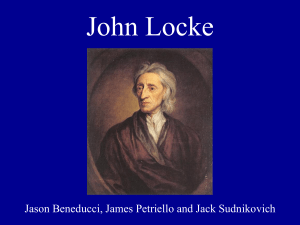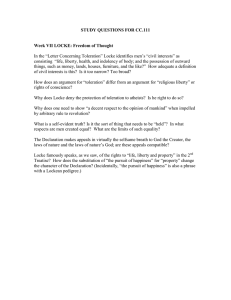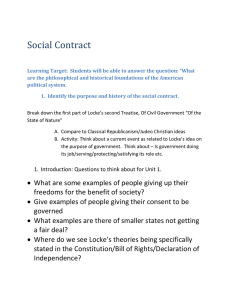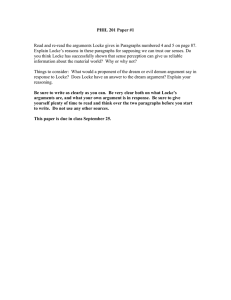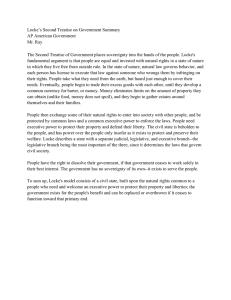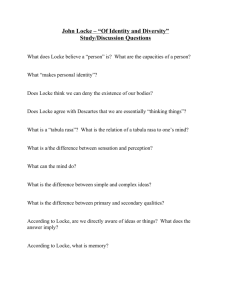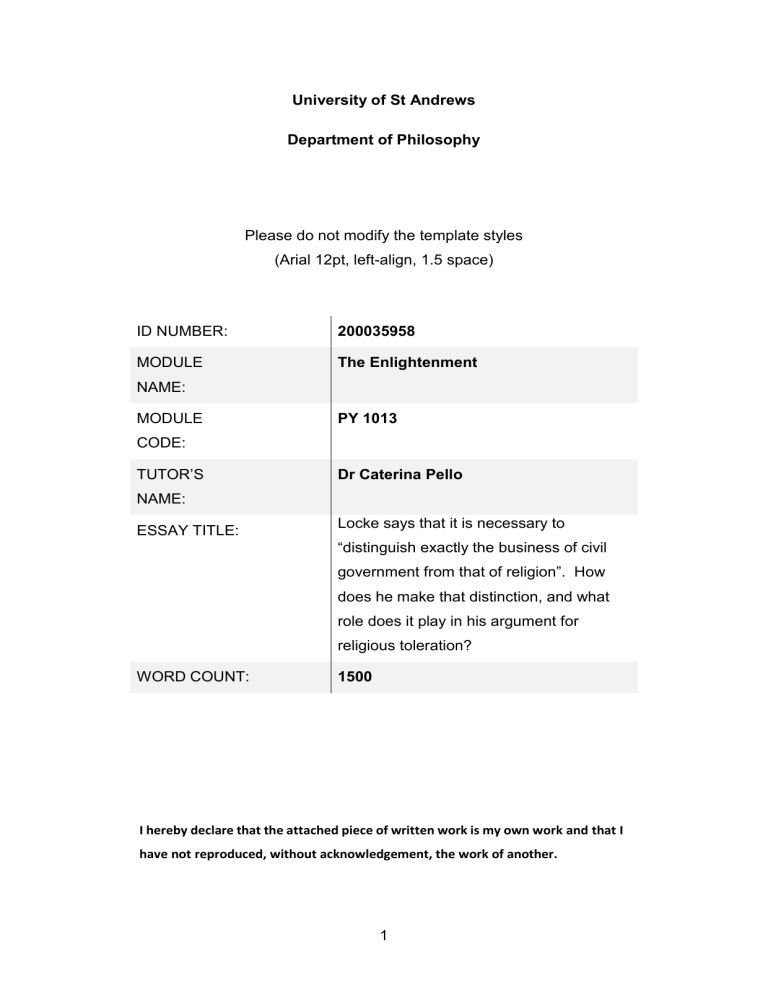
University of St Andrews Department of Philosophy Please do not modify the template styles (Arial 12pt, left-align, 1.5 space) ID NUMBER: 200035958 MODULE The Enlightenment NAME: MODULE PY 1013 CODE: TUTOR’S Dr Caterina Pello NAME: ESSAY TITLE: Locke says that it is necessary to “distinguish exactly the business of civil government from that of religion”. How does he make that distinction, and what role does it play in his argument for religious toleration? WORD COUNT: 1500 I hereby declare that the attached piece of written work is my own work and that I have not reproduced, without acknowledgement, the work of another. 1 John Locke (1632-1704) composed “Epistola de Tolerantia” in Latin at the end of 1685 wherein he argued the case for religious toleration. The work was later translated into English and re-titled “A letter concerning Toleration”. Hereinafter Letter. Locke’s Letter must be understood in the wider context of the period and none more so than as a direct response to the Edict of Fontainebleau in 1685 by Louis XIV which revoked the rights granted to the Protestants within France (Robertson,2015,36). The singular effect of this event is evident in the fact that Locke had not previously argued for religious toleration in his earlier work, such as the 1660 “Two Tracts on Government” wherein his view of the boundaries between civil government and religion was far more aligned with Thomas Hobbes’s own within Leviathan (Vernon,2010,XII;Robertson,2015,36;Creppell,1996,204-216).1 In seeking the ‘why now?’ of the Letter it is clear that Locke had become convinced that the problem lay in government trying to enforce one religious order over another (Galenkamp,85) and accordingly found it necessary to reason for religious toleration by reference to the New Testament and the boundary between church and state. The Letter can broadly be summarised as arguing for three distinctions between civil government and religion. While the English terminology is dependent on translation, for the purposes of this essay they will be categorised as distinctions of Origin, Ends and Business.2 “You are confounding heaven and earth…utterly different from each other in origin, purpose and substance” (Locke,2010,15). “which are in their Original, End, Business, and in every thing, perfectly distinct and infinitely different from each other” (Locke,1983,33). This essay shall be concerned with the latter distinction only and shall identify the way in which Locke argues and defines them as well as briefly discussing his use of 1 Leviathan (1651) argued that government had the authority to control anything that might disturb the peace, including religion. 2 ‘Origin’ to be understood as its formation that tied into Locke’s social contract theory and his theory of the voluntary association of the church. ‘Ends’ to be understood as eternal life for religion and the prosperity of society for civil government. 2 Cartesian Dualisms to support his position. The three distinctions, once established by Locke, are then correlated to three separate arguments for religious toleration; The “Mandate” argument, the “Error Argument” and the “Belief” argument (Vernon,2010,XV).3 This essay shall argue that the business distinction plays a central role in the “Belief” argument.4 Prior to coming to a conclusion, counter points to the “Belief” argument shall be considered. Within the Letter, Locke argues that the business of civil government is the care of people’s lives and the maintenance of their material items, such as property and money and the protection of this by the use of force, coercion and common law punishments such as jail or even a death sentence. “thus the safeguard of men’s lives, and of the things that belong unto this life, is the business of the commonwealth and the preserving of those things…is the duty of the magistrate” (Locke,1995,90). “It is the duty of the civil magistrate, by the impartial execution of equal laws, to secure unto all the people in general…the just possession of these things belonging to this life” (Locke,1995,83). In contrast, the business of religion is argued by Locke to be the worshipping of God, belief, the care of people’s souls and the teaching of how people may obtain eternal life in heaven. “the purpose of a religious association…is public worship of God and the attainment of eternal life by means of it” (Locke,2010,11). While Locke concedes that the church has the capacity to punish also, it is limited by Locke to “warnings” and “advice” prior to ejection from the church (Locke,2010,12). It is noteworthy that Locke makes use of dualisms within the Letter (Creppell,1996,220). Inspired by Descartes, (O’Grady,2018,53) Cartesian dualism is Arguably, the “Belief” argument is central (Tuckness,2008) While the “Mandate” argument is linked to the distinction of “Origin” and the “Error” argument linked to the distinction of “Ends”. 3 4 3 referenced wherein civil government is associated to the body and religion is associated to the mind. “Civil interests I call life, liberty, health and indolency of body” (Locke,1995,82). “religion consists in the inward persuasion of the mind” (Locke,1995,83.) Further use of dualism is seen in Locke’s association of civil government as “outward” while religion is “inwards”. In addition, civil government is connected to the public sphere, whereas religion to the private sphere. These references are clearly utilised by Locke to ensure the success of his argument in making distinct the boundaries between civil government and religion. With the distinction between civil government and religion now self-evident, Locke utilises it as the central premise to support his “Belief” argument. This argument holds that religious belief is only achieved through “light” and the “inward persuasion of the mind”.5 Civil government cannot coerce or change belief because the means available to it are outward force, laws and compulsion. It is therefore irrational for civil government to try to force religion belief on any person when it is clearly incapable of achieving it with the means available to it. Therefore, in the absence of force, people are free to choose their own religion therein permitting religious toleration (Waldron,1988,76). The argument can be summarised as: (1) Sincere religious belief is only caused by an inward persuasion of the mind (2) The business of civil government is only outward force and laws (3) Therefore, civil government cannot force sincere religious belief (4) Therefore, toleration I shall argue that (1)-(4) are all susceptible to challenges. 5 ‘Light’ meaning reason. 4 Within Premise (1) Locke seems to call upon his concept of “light” and “evidence” as being the only factors capable of producing this persuasion of the mind rather than any outward force. “It is only light and evidence that can work a change in men’s opinions” (Locke,1995,84). Yet while “light” and “evidence” could perhaps account for a religious conversion they do not really provide an account of original belief. Locke does in earlier work discuss the difference between self-evident knowledge, such as a geometric proof, and religious belief which is dependent on matters of faith and is fallible (Ward,2008,527). Therefore it leaves a question mark over how “light” and “evidence” can really account for religious belief when Locke seems to accept himself that religious belief is in a different category from demonstratable truth (Vernon,2010,XXVI). Premise (2) holds that the business of civil government is only outward force, compulsion and laws. Jonas Proast challenged this concept by adopting Locke’s social contract formation of civil government wherein it is formed for the good of society (Tuckness,2008,120-121). Since religion encourages good conduct towards others then it is for the good of society, and accordingly, should be part of the remit of civil government. Locke does provide a good counter argument for this within his “Error” argument by highlighting the problem of civil government knowing true religion.6 Minor conclusion (3) holds that civil government cannot force sincere religious belief and is perhaps the most challenged element of Locke’s work by such figures as Jonas Proast. While it could be accepted that “to compel with the sword” (Locke,1995,84) will not produce religious belief it does not necessarily follow that some level of force could not in combination with reasons and arguments effect religious belief. 6 For further discussion on this, see Ward,2008,521-522. 5 “If Force be used, not in stead of Reason and Arguments…but onely [sic] to bring men to consider those Reasons and Arguments which are proper and sufficient to convince them” (Proast,1690,5) Proast’s arguments were supported by Jeremy Waldron who also highlighted the the state’s ability to restrict information to the public that, through reading, could either result in convincing them of a belief or altering their belief (Waldron,1988,81). This is particularly compelling and highly relevant in the 21st century wherein we appear to be witnessing the Chinese government altering religious belief within its Xinjiang Uyghur region through re-education camps (BBC News). Major conclusion (4) could be said, in its most basic format to hold If separation of civil government from religion, Then religious toleration (if P, then Q). Yet this logic would fail the empirical acid test insofar as in an increasingly secular world since the 17th century, the concept of the separation of church from state has been well established and is constitutionalised in most states. Yet religious toleration is arguably not evident throughout the world as evidenced by atrocities like the Holocaust, Rwanda and more generally, within everyday 21st century society. In conclusion, Locke’s argument for the distinction between the business of civil government and religion is utilised to underpin his argument of belief which is arguably the main argument within the Letter (Tuckness,2008). But the argument falls apart due to a failure in imagination by Locke in taking full account of the ways in which civil government could apply force to effect. Arguably, the case for toleration is better found within Locke’s references to the New Testament than in his appeal to rationality. 6 References Primary Sources Locke, John (1983) “A Letter concerning Toleration” Translated by William Popple in John Locke: A letter concerning Toleration (Ed: James Tully) Hackett Publishing Company Inc, Indianapolis Locke, John (1995) “A Letter concerning Toleration” in The Portable Enlightenment Reader (Ed: Isaac Kramnick) Penguin books. New York. Locke, John (2010) “A Letter concerning Toleration” Translated by Michael Silverthorne in Locke on Toleration (Ed: Richard Vernon) Cambridge University press, New York. Secondary Sources BBC News, “Data Leak reveals how china “brainwashes” Uighurs in prison camps. 24 November 2019. https://www.bbc.co.uk/news/world-asia-china-50511063 Creppell, Ingrid (1996) “Locke on Toleration: The Transformation of Constraint” in Political Theory, Volume 24, Issue 2. 200-240 Proast, Jonas (1690) “The Argument Of the Letter Concerning Toleration, Briefly Considere’d and Answer’d” THEATRE, Oxford. http://name.umdl.umich.edu/A55925.0001.001 Robertson, John (2015) “The Enlightenment: A very short introduction” Oxford University Press. Oxford Tuckness, Alex (2008) “Locke’s Main Argument for Toleration” in Nomas, Volume 48, Toleration and Its Limits. 114-138 7 Vernon, Richard (2010) “Introduction” in Locke on Toleration (Ed: Richard Vernon). Cambridge University Press, New York. Waldron, Jeremy (1988) “Locke: Toleration and the rationality of persecution” in Justifying Toleration: Conceptual and Historical Perspectives (Ed S Mendus). Cambridge University Press, Cambridge. 61-86 Ward, Lee (2008) “Lock on Toleration and Inclusion” in Ratio Juris, Volume 21, Issue 4. 518-540 8

